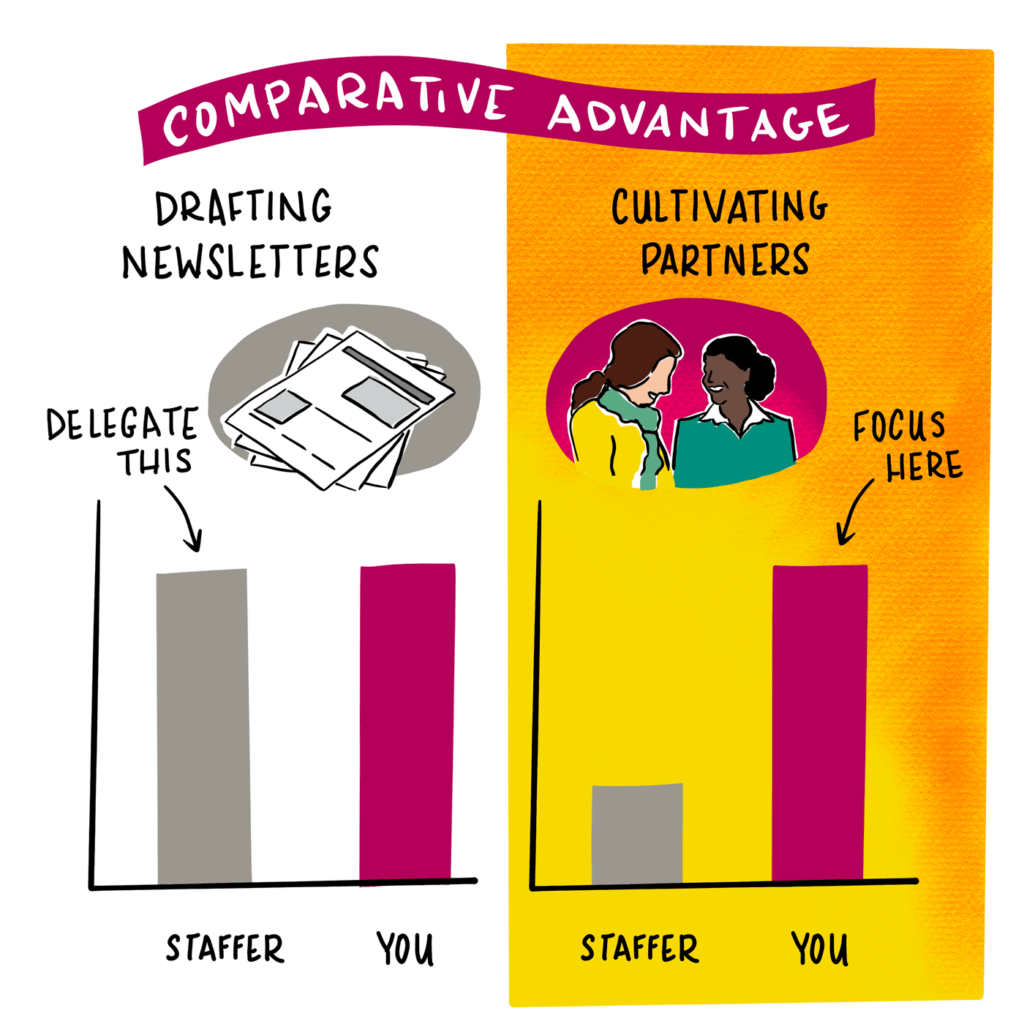If you’re like a lot of managers we know, delegating can be tricky, especially when you’re delegating work that you have the ability to do yourself. For example, as the head of your development team, you might have a lot of experience drafting grant proposals—perhaps more than anyone else on your team. However, as the leader of your team and the person with the most long-standing relationships in your community, cultivating major donor relationships is a more strategic use of your time and skills (even though you really enjoy writing those proposals). Your time is also better spent managing the people on your team who were hired because grant writing is their specialty. As part of being a manager, you might also support them to build skills around donor cultivation as part of their development and to increase the sustainability of your work.
Spending your time and resources where you can make the greatest impact or get the best results is an economic concept called comparative advantage.
Use comparative advantage to decide what work you should own and what you should move off your plate, either through delegation or by deprioritizing completely. For managers, understanding your and your team members’ comparative advantage can help you craft role expectations and must-haves for hiring, design MOCHAs, figure out the division of labor on your team, and reprioritize.
To identify your (or others’) comparative advantage, think about everything that’s on your plate and consider the following criteria for each item:
- Impact: Will it have a substantial impact on furthering your organization or team’s mission?
- Role: Does it fit within your role expectations and position in the organization?
- Strengths: Are you excellent (not just good) at the thing? (Alternatively, are you the only one who is excellent or good at it?)

If you can answer yes to all three questions for an area of work, then it should stay on your plate. If there’s anything on your list that doesn’t hit at least two of the criteria, move it off (by delegating or deprioritizing altogether). For items that only hit two of the three criteria, consider whether you should delegate (if it doesn’t make sense to do as part of your role or if it’s not a strength), develop your skills (if it’s not currently a strength but is a must-have for your role), or reconsider entirely (if it’s not high-impact). After you’ve decided what to move off your plate, identify specific next steps.
Example: Let’s say you are a new Communications Director and your team needs to execute a full website redesign this year. A project of this scale and impact fits within your role. If you had skills in web design and management, this would likely fall within your comparative advantage. However, your strengths are in public relations, messaging, and earned media work, and you have a staff member who has managed web redesigns before. Using the principle of comparative advantage, you decide to delegate ownership of the project. Your next step is to think through the 5 W’s, develop clear guidelines on the decisions that need your input and approval, and set up a delegation conversation with your staff member to get aligned on expectations and the MOCHA.
For more support on identifying your comparative advantage, check out our Comparative Advantage Worksheet.
Tips to keep in mind:
Only do what only you can do.
Consider this a rule of thumb for identifying your comparative advantage—what are the things that only you should do, by nature of your role, position, or your competencies? This tip is especially important if you’re managing someone whose job you used to have. It’s common and tempting to hold on to the work that is familiar and that you’re good at. But their job isn’t your job anymore—your job is to manage.
Be mindful about what you pass off (and to whom).
It’s tempting to use comparative advantage to pass off work that you don’t enjoy or aren’t good at. Sometimes, this is the right call, especially if the tasks are time-consuming and your energy would make greater impact elsewhere. However, make sure that you’re delegating intentionally and equitably. Women, and particularly women of color, often get burdened with the (often invisible) logistical and emotional work that make an organization run (consider who was assigned to be a notetaker at your last meeting). If you frequently find yourself delegating ongoing tasks (like fielding inquiries, scheduling, etc.) that become extra work for others, make it an explicit part of someone’s role.
You might not be good at everything (and that’s okay).
There may be things on your plate that only meet the “impact” and “role” parts of the comparative advantage criteria—they make sense for you to do given your role and they are mission-critical, but you’re not great at them and they can’t be delegated. In those cases, focus on developing your competencies (which may involve delegating more to free up time and energy for learning!).
Now, get started with our Comparative Advantage Worksheet!